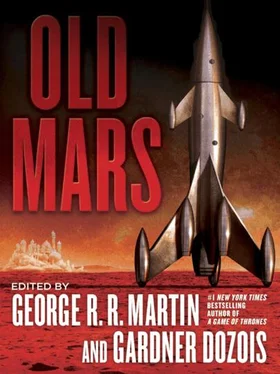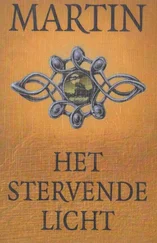The spider-car deposited us at a platform of heat-ray-polished sandstone before the onyx gates. The steel tentacle tips of our guards clacked on the mirror rock. The gates stood five times human height—they must have been overpowering to the shorter Uliri—and were divided in three according to Uliri architecture, and decorated with beautiful patterns of woven tentacles in high relief, as complex as Celtic knotwork. A dot of light appeared at the center of the gates and split into three lines, a bright Y. They swung slowly outward and upward. There was no other possibility than to enter.
How blind we humans had been, how sure that our mastery of sky and space gave us mastery of this world. The Uliri had not been driven back by our space bombardments and massed skymaster strikes, they had been driven deep . Even as the great Hives of Syrtia and Tempe stood shattered and burning, Uliri proles had been delving deeper even than the roots of their geothermal cores, down toward the still-warm lifeblood of their world, tapping into its mineral and energy resources. Downward and outward; hive to nest to manufactory, underground redoubt to subterranean fortress, a network of tunnels and delvings and underground vacuum tubes that reached so far, so wide, so deep, that Tharsia was like a sponge. Down there, in the magma-warmed dark, they built a society far beyond the reach of our space bombs. Biding their time, drawing their plans together, sending their tendrils under our camps and command centers and bases, gathering their volcano-forged forces against us.
I remembered little of the journey in the mole-machine except that it was generally downward, interminably long, and smelled strongly of acetic acid. Count Jack, with his sensitivities, discreetly covered his nose and mouth with his handkerchief. I could not understand his reticence: the Uliri had thousands better reasons to have turned us to ash than affront at their personal perfume.
Our captors were neither harsh nor kind. Those are both human emotions. The lesson that we were slow to learn after the Horsell Common attack was that Martian emotions are Martian. They do not have love, anger, despair, the desire for revenge, jealousy. They did not attack us from hate, or defend themselves from love. They have their own needs and motivations and emotions. So they only seemed to gently usher us from the open hatches of the mole-machine (one among hundreds, lined up in silos, aimed at the upper world) into a vast underground dock warm with heart-rock, and along a pier to a station, where a spider-shaped glass car hung by many arms from a monorail. The spider-car accelerated with jolting force. We plunged into a lightless tunnel, then we were in the middle of an underground city, tier upon tier of lighted windows and roadways tumbling down to a red-lit mist. Through underwater waterfalls, through vast cylindrical farms bright with the light of the lost sun. Over marshaling yards and parade grounds as dense with padvas as the shore is with sand grains. Factories, breeding vats, engineering plants sparkling with welding arcs and molten steel. I saw pits miles deep, braced with buttresses and arches and spires, down and down and down, like a cathedral turned inside out. Those slender stone vaults and spires were festooned with winged horrors—those same four-winged monsters that had plucked us out of the sky and so casually, so easily, dismembered our crew. And allowed us to live.
I had no doubt that we had been chosen. And I had no doubt why we were chosen.
Over another jarring switchover, through another terrifying, roaring tunnel, then out into a behemoth gallery of launch silos: hundreds of them, side by side, each loaded with fat rocket ships stiff with gun turrets and missile racks. I feared for our vaunted Spacefleet, and, realizing that, feared more for myself. Not even the alien values of the Uliri would show us so much if there were even the remotest possibility we could return the information to the Commanderie.
Count Jack realized it in the same instant.
“Christ on crutches, Faisal,” he whispered.
On and on, through the riddled, maggoty, mined and tunneled and bored and reamed Under-Mars. And now the onyx gates stood wide and the padvas fell into a guard around us and prodded us through them. The polished sandstone now formed a long catwalk. On each side rose seats, tier upon tier of obsidian egg cups. Each held an Uliri—proles, gestates, padvas, panjas—arranged by mantle color and rank. From the detail of the etchings on their helmets and carapace covers, I guessed them to be of the greatest importance. A parliament, a conclave, a cabinet. But the true power was at the end of the long walk: the Queen of Noctis herself. No image had even been captured, no corpse or prisoner recovered, of an Uliri Queen. They were creatures of legend. The reality in every way transcended our mythmaking imaginations. She was immense. She filled the chamber like a sunrise. Her skin was golden; her mantle patterned with soft diamond-shaped scales like fairy armor. Relays of inseminators carried eggs from her tattooed multiple ovipositors, slathering them in luminous milt. Rings of rank and honor had been pierced through her eyelids and at the base of her tentacles. Her cuirass and helmet glowed with jewels and finest filigree. She was a thing of might, majesty, and incontestable beauty. Our dress heels click-clacked on the gleaming stone.
“With me, Faisal,” whispered Count Jack. “Quick smart.” The guard stopped, but Count Jack strode forward. He snapped to attention. Every royal eye fixed on him. He clicked his heels and gave a small, formal bow. I was a heartbeat behind him. “It’s all small beer after the Pope.”
A tentacle snaked toward us. I resisted the urge to step back, even when the skin of the palp retraced and there, there was a human head. And not any human head: the head of Yuzbashi Osman, the music lover of Camp Oudeman, whom we had last seen leading a bold and stirring—and ultimately futile—charge against the padva hordes. Now the horror was complete. The Yuzbashi opened his eyes and let out a gasping sigh. The head looked me up and down, then gave Count Jack a deeper scrutiny.
“Count Jack Fitzgerald of Kildare-upon-Ireland. Welcome. I am Nehenner Repooltu Sevenniggog Dethprip; by right, battle, and acclaim the uncontested Queen of Noctis. And I am your number one fan.”
One finger of rum in Count Jack’s particular tea. And then, for luck, for war, for insanity, I slipped in another one. I knocked, waited for his call, and entered his dressing room. We might be somewhere in the warren of chambers beneath the Hall of the Martian Queen, miles beneath the sands of Mars, but the forms must be observed. The forms were all we had.
“Dear boy!” Uliri architecture did not accommodate human proportions. Proles had been at work—the prickly tang of scorched stone was strong—but I still had to duck to get through the door. Count Jack sat before a mirror of heat-ray-polished obsidian. He adjusted the sit of his white bow tie. He filled the tiny cubbyhole, but he still took the tea with an operatic flourish and took a long, County Kildare slurp.
“Ah! Grand! Grand. My resolve is stiffened to the sticking point. By God, I shall have need of it today. Did you slip a little extra in, you sly boy?”
“I did, Maestro.”
“Surprisingly good rum. And the tea is acceptable. I wonder where they got it from?”
“Ignorance is bliss, Maestro.”
“You’re right there.” He drained the cup. “And how is the piano?”
“Like the rum. Only I think they made it themselves.”
“They’re good at delicate work, the worker-drone thingies. Those tentacle tips are fine and dexterous. Natural master craftsmen. I wonder if they would make good pianists? Faisal? Dear God, listen to me listen to me! Here we are, like a windup musical box, set up to amuse and titivate. A song, a tune, dance or two. Us, the last vestige of beauty on this benighted planet, dead and buried in some vile subterranean cephalopod vice pit. Does anyone even know we’re alive? Help us for God’s sake help us! Ferid Bey, he’ll do something. He must. At the very least, he’ll start looking for us when the money doesn’t materialize.”
Читать дальше












